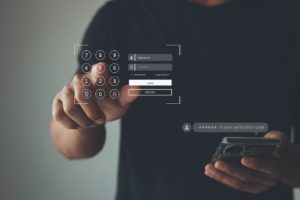In the modern world, getting hacked and/or having your credentials stolen from a once-trusted service is like catching a cold. It may not happen to everyone every year, but it’s pretty darn common, and the environment moves too fast for anything to be guaranteed 100% hacker-proof. When it comes to user accounts, employee accountability, and keeping your proprietary data secure is worth the effort – especially when that effort is fairly quick, easy, and familiar for all users.
Multi-Factor and the Cloud
Multi-factor authentication is the padlock on the locked shed of your user and data security. Hackers buy and sell stolen login credentials and specialize in new ways to steal them. A password is only so secure, and even live anomaly detection systems are not perfect. The importance of security only increases as we move to the cloud – where data is available to any authorized user at any time – as part of the core principles of cloud service. Two-factor authentication takes that security one step further (or more) in ensuring that the real authorized human is on the other end of every login.
If you don’t have it now, you need to have these services on your business applications and systems to prevent your business from being the next cybersecurity breach in the news.
Office 365
If your team uses Office 365, you use your Microsoft password and login for everything which means being compromised just once can give access to all your work logins at once. This is one of the primary sources of internal wire fraud attacks. A lot of time it occurs in this manner where once they have access to your email they email other employees requesting gift cards or to do a wire transfer.
Multi-factor, however, prevents hackers from being able to take the final step just to login. The need to have both the stolen login credentials and the victim’s personal phone at the same time makes this prospect nearly impossible -which is why there are scams where hackers will ask you to relay your multi-factor codes. Don’t do that.
VPN Connections
VPNs are Virtual Private Networks. If your business works with a VPN, then you have opened an internal network space so it is available for remote employees through a VPN login. If one internal user’s login is compromised, the entire virtual network and all your internal file systems may be put at risk.
Multi-factor authentication, however, requires that a live human in the company receive a text every time an account tries to log in. If it is their account and they weren’t trying to access the system, this throws an immediate red flag. Not only is the hacker unable to get past the login stage of their planned intrusion, but they might be more profoundly caught.
You can also use each un-initiated multi-factor text message as a trigger to change passwords company-wide, invalidating all previously stolen credentials on the spot.
Multi-Factor is a Modern Necessity Made Easy
Today, we need more than passwords to secure every account, and multi-factor authentication is a quick, easy solution to an ongoing challenge.
Whether it be office 365, VPN connections, or other cloud-based software, having multi-factor authentication prevents thieves from accessing your data because they are not going to have your cell phone. When you have your wallet stolen, you cancel credit cards to prevent them from falling into the wrong hands. Your phone is the modern wallet and today, you or a business can remotely wipe your phone if it is lost or stolen to keep your data from falling into the wrong hands. Today, a person’s phone is the last key to gaining access to company data through multi-factor authentication.
Are you ready to incorporate multi-factor authentication into your cloud services? Are you ready to help your employees and infrastructure evolve beyond password security? So are we.
If you have not already implemented MFA on your line of business (LOB) software, give us a call and we can assist you in navigating these waters to protect your business. Contact us here so we can review your current policies and look at ways to tighten your security so you’re not the next business target that we read about in the news.

